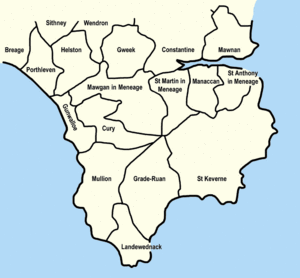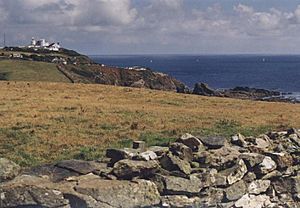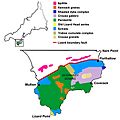The Lizard facts for kids
The Lizard is a special piece of land, like a long arm, that sticks out into the sea in south Cornwall, United Kingdom. It's famous for being the most southerly point of the British mainland. Near Lizard Point, you'll find Lizard village, which is also the most southerly village in mainland Britain.
This peninsula is about 14 miles (23 km) long and 14 miles (23 km) wide. It's located southwest of Falmouth and about 10 miles (16 km) east of Penzance.
The name "Lizard" probably comes from the old Cornish words "Lys Ardh," which mean "high court." It has nothing to do with the rock called serpentinite that is found there.
The coast around The Lizard can be very dangerous for ships. In the past, the seas here were even called the "Graveyard of Ships" because so many boats got into trouble. To help guide ships, the Lizard Lighthouse was built at Lizard Point in 1752. Today, the RNLI has a lifeboat station at The Lizard, ready to rescue people at sea.
Contents
Exploring The Lizard's Geography
The Lizard Peninsula is made up of several local areas called parishes. These include:
- Northern parishes:
- Gunwalloe
- Cury
- Mawgan-in-Meneage
- St Martin-in-Meneage
- Manaccan
- St Anthony-in-Meneage
- Southern parishes:
- Mullion
- Grade-Ruan
- St Keverne
- Landewednack
Some of these parishes, especially in the northeast, are part of a region known as the Meneage.
Understanding The Lizard's Geology
The rocks of The Lizard Peninsula are very special to geologists (scientists who study rocks). They show a rare example of something called an ophiolite in the United Kingdom. An ophiolite is like a cross-section of the ocean floor that has been pushed up onto the land.
Scientists have found three main types of rock formations here:
- Serpentinites: These are unique green rocks.
- Oceanic complex: These rocks were once part of the ocean floor.
- Metamorphic basement: These are older rocks that have changed due to heat and pressure deep underground.
Discovering The Lizard's Ecology
The Lizard Peninsula is home to many important nature sites. These include the Predannack nature reserve, Mullion Island, and Goonhilly Downs. A large area of The Lizard, covering about 1,662 hectares (6.42 sq mi), is protected as a National Nature Reserve. This is because of its special coastal grasslands, heaths (open, uncultivated land), and inland heaths.
The Lizard has some of the most unique and rare plants in all of Britain. Many of these plants are endangered, meaning they are at risk of disappearing forever.
Images for kids
-
Coverack is a pretty coastal village on the eastern side of The Lizard.
See also
 In Spanish: The Lizard para niños
In Spanish: The Lizard para niños
 | William L. Dawson |
 | W. E. B. Du Bois |
 | Harry Belafonte |





